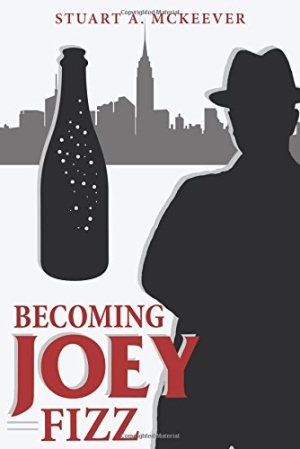Becoming Joey Fizz
Told in a Korean war veteran’s unique voice, this story illuminates American life through believable and likable characters.
Like so many soldiers returning from battle, Joey Mancuso arrives in California from the Korean War with no real plans or ambitions. With his psyche and his belief in man shattered due to the horrors he witnessed, Joey begins a long trek through the country as he tries to find meaning and purpose in his life. So begins this bildungsroman, told in Joey’s voice: the story of a young New Yorker searching for his place in the changing society of the United States.
Beginning as an odyssey through the United States, this novel travels through nearly all regions of the country, and shows their peculiarities and unsavory elements. A gruff and aimless but good man, Joey begins his journey by taking a blinded friend to Yosemite to allow him an experience that he fears never to have again. This completed, he sets out to reconnect with army buddies or, occasionally, the grieving parents of those who did not survive the war. One particular stand-out scene involves his venture into Memphis, then a cauldron of race hate as well as home to the burgeoning music of Beale Street. Meeting with a friend to see the sights, Joey is instead roped into a card game. Dealing with racist Southern mobsters, proudly unreconstructed supporters of segregation, he barely escapes serious harm when things don’t go quite the way they planned.
The straightforward narrative makes the text feel more like a memoir and, as a full portrait of Joey comes into focus, he begins to resemble a classic New York figure. An Italian immigrant, he finally returns to his city, with his restaurateur father, troubled brother, and ne’er-do-well uncle with connections to organized crime. The city is evoked well in the text, a blend of cultures and communities, sights and smells, producing a vibrancy unparalleled. As Joey, lost as he is, becomes involved with unsavory activity, the novel truly opens up and begins to take form, moving beyond the United States and giving the reader a character study of a man who, despite his faults, is both likable and—though at times it can seem more like caricature—believable.
In particular, it’s Joey’s voice, informing the text and relating events both past and present in near colloquialisms, that makes Becoming Joey Fizz such a pleasurable page-turner. The first-person narration does have its limits as an effective communicative tool, however. While it most certainly characterizes the antiauthoritarianism of Joey, and imparts a generally casual and realistic tone, it impedes the storytelling by becoming overbearing. The effect is that the fully realized character speaking in his own voice is not someone interesting or unique for the story’s entirety. As Joey moves through a rapidly changing America and tries to find his place, the story becomes familiar, akin to Forrest Gump or Woody Allen’s Zeilig. That’s not to say that Becoming Joey Fizz mirrors these stories exactly, but that aspects of the work are derivative.
There are undoubtedly genuine moments in the text that illuminate life in America in the years after the Korean War. The tale here serves as a counter, in many ways, to The Godfather, and as the book comes to embrace an unromantic view of organized crime, a driven plot emerges. Becoming Joey Fizz will entertain readers looking for a nostalgic romp through America’s golden years, led by a man with heart.
Reviewed by
Alex Franks
Disclosure: This article is not an endorsement, but a review. The publisher of this book provided free copies of the book and paid a small fee to have their book reviewed by a professional reviewer. Foreword Reviews and Clarion Reviews make no guarantee that the publisher will receive a positive review. Foreword Magazine, Inc. is disclosing this in accordance with the Federal Trade Commission’s 16 CFR, Part 255.

